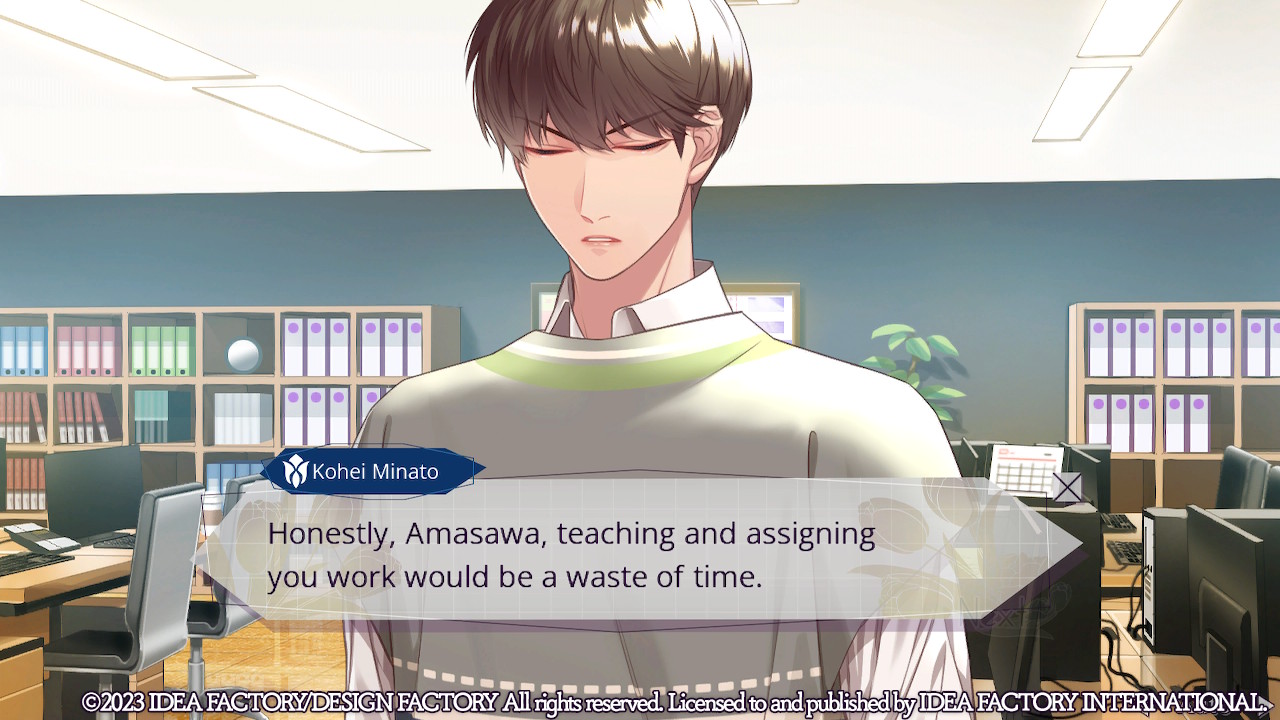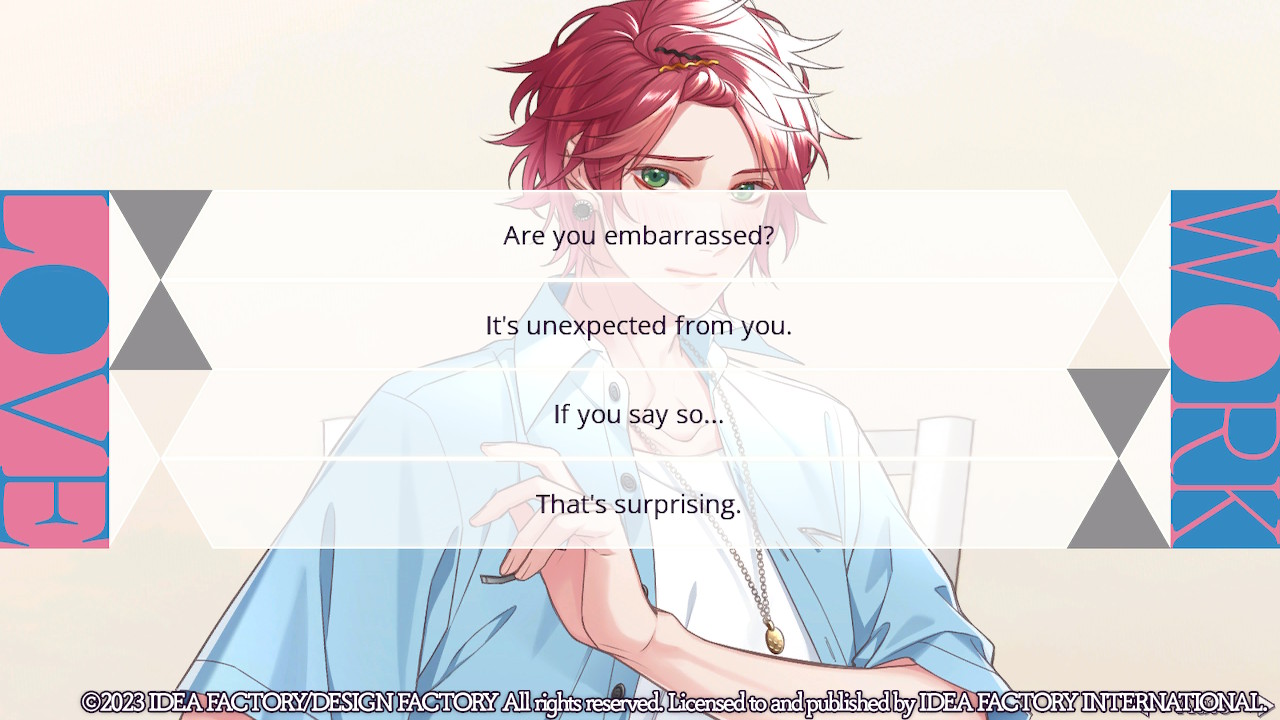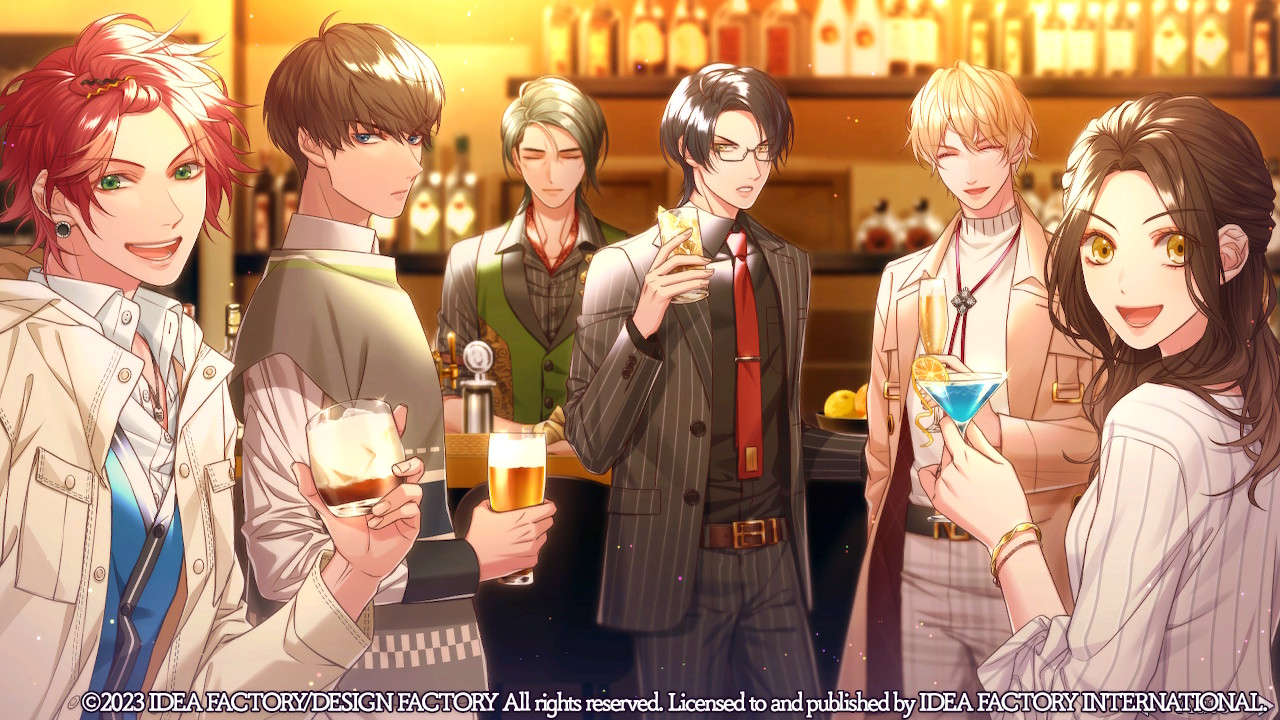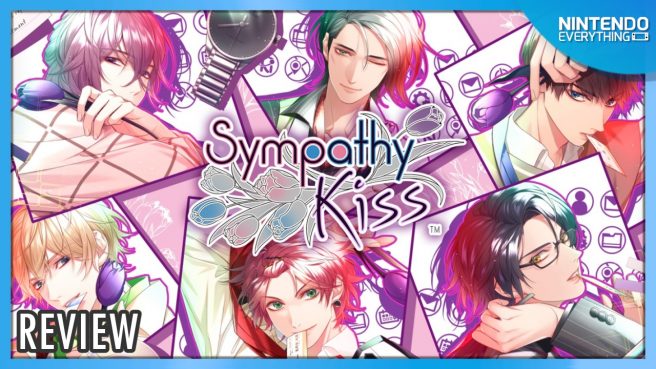System: Switch
Release date: February 27, 2024
Developer: Idea Factory
Publisher: Idea Factory
Akari Amasawa is someone that I’m sure plenty of us can relate to: she wakes up in the morning, she goes to work after breakfast, and she comes home in the evening. Rinse and repeat. Her job is one that could be done by basically anyone, and her life is unremarkable. But really, what else can you expect? That’s just life. But even unremarkable circumstances can change, and for Akari, who has been with IT company Estario Corp. as a designer for almost a year, her work life (and, of course, her personal life) is suddenly turned upside-down when she is recruited as part of a small team to save one of the company’s founding apps, which has been losing momentum as it is pushed out by the competition. Her new role is uncertain, and her new colleagues are strangers. In Sympathy Kiss, a new otome title from Idea Factory, you’ll be joining her on her journey to navigate the perilous trenches of work, romance, and life. The choices you’ll make along the way are probably not what most people would do in her situation, but it’s certainly a nice break from the stressors of everyday life.
Even as an avid reader of otome visual novels, I often find the opening hours can be difficult to get through. Pacing in the common route (the events shared between all characters before the paths diverge to focus on individuals) can be quite rough, as it tries to both introduce you to the cast enough to form an attachment to them while simultaneously bombarding you with technical jargon relating to its fantasy setting so that you’ll have some frame of reference for the events to come. Breaking from that established norm, I found Sympathy Kiss to be remarkably refreshing because it has absolutely none of these pacing issues in its opening prologue.
As Akari (whose name can be changed if you so wish) you are an ordinary office worker thrust into a new role that you will decide the direction of for yourself, and your colleagues are people you may be passingly familiar with but who are ultimately strangers to you. The game is presented in a relatable fashion that is almost entirely true to real life, and so there is no need to bombard you with new terms to frantically look up in the dictionary every few sentences. This feature is used very sparingly, having a meager 62 entries spread out across individual routes, and are more a point of reference for characters, or specific jargon you may not have heard before, but are by no means essential to understanding the setting or story. To the contrary, the game seems as determined to omit the specific details of the work the characters do as possible, never lingering for too long on them even when they’re actually being discussed.

Without this need to familiarize yourself with a strange new world or learn an exhaustively convoluted set of new terms, you’re free to dive straight in and focus your attention on the cast. That core cast of love interests is the sole focus of the game, and although their personalities all fall into some entirely expected stereotypes, and the dialogue can range from cliche to downright disturbing when the romance heats up, I found all of them to be surprisingly nuanced and possessing hidden depths that I didn’t expect them to have based on their first impressions. The cheerful and friendly Mitsuki Saotome, for instance, is actually something of a closed-off perfectionist, leading to some very tense exchanges over the course of his route that completely contradict how he presents himself in the prologue, and he becomes a much more complex character over the course of his six episode story. In between episodes you’ll get the opportunity to explore an event from their perspective as well, which can be quite enlightening as their view of events is often completely different from Akari’s.
This added level of complexity makes the love interests feel far more alive as characters, and it had me more invested in their personal struggles. It’s all quite low-stakes drama for the most part but strangely compelling despite this, or perhaps even because of it: the problems the characters have are easy to relate to and sympathize with, and Sympathy Kiss dives into some emotionally potent topics that are handled with a surprising level of depth and sensitivity, including workplace-related stress and anxiety, burnout, and more complicated office politics and conflict. If you’ve ever worked in an office environment before, a lot of what is presented here could very well mirror your own experiences at times, and I found it easy to relate to Akari in particular as someone relatively inexperienced surrounded by people who (at least at first glance) are more confident and capable than her.
With that said, Akari is unfortunately quite underwhelming when it comes to her character development and growth, and although the story unfolds from her perspective and you get an inside view of her thought process, she only ever describes things, rather than actually speaking in the first person. The idea here is for the player to put themselves in her shoes (this is exacerbated even further by the in-game CGs, which go out of their way to hide her face, and the fact that she doesn’t have a character portrait) but it can make for some awkward and one-sided conversations as the characters on-screen react to what she has said without you actually getting to see that dialogue. Given the strength of the writing and how Akari’s anxieties about her performance in the workplace are often brought front and center in the narrative, it would have been nice to have her as a more developed and fully realized character.

Sympathy Kiss features branching pathways and multiple endings, and as you might expect there are a lot of choices for you to make in the game, although the majority of these are more in the nature of flavor text that personalize the experience. With the Emotion Select system you’ll be given the choice between two emoji to react to something in conversation, and your reaction will often be noted for future dialogue; for example, you can react positively or negatively to a discussion about siblings to indicate whether you have a sibling yourself. It doesn’t significantly impact the direction the story takes, but does add a nice personal touch to break up the more scripted dialogue. You’ll also occasionally be given a choice of two minor dialogue choices, both as normal text and via the RiNG app on your phone; Akari has a fondness for using emoji as responses that I found to be quite endearing.
The pivotal story moments which come once per episode are more clearly telegraphed. A vocal track will usually begin to play softly in the background, and you’ll be presented with four dialogue choices. Two of these will relate to the “Work” ending while the other two will relate to the “Love” ending, and normally one of each will fill the corresponding meter and bring you closer to the outcome you desire. Fortunately the game makes it very easy for you to manipulate the circumstances to your liking: the “Love Catch” system (which can be disabled if you’d prefer to play through blind) will indicate with a blue or pink flower which route your choice relates to, and checking the Status option from the menu will show if that choice has had an impact or not.
This is not an uncommon feature in otome titles, but it’s executed particularly well here and it makes getting the ending that you want much easier to accomplish without needing to resort to keeping multiple save files at each critical junction. At the absolute most you’ll need to reload three times to check the impact of each choice, although it’s usually fairly obvious which one to choose for a particular outcome. Once you’ve completed a character’s route you are also able to go back to any episode in that story from the menu, adjusting both the Work and Love meters to high or low, making it very easy to get the other endings. The game also has two skip functions (one for read text, and one for all text) to help you specifically pinpoint dialogue you missed, cutting down on time you would have otherwise spent re-reading things. This all makes seeing everything that Sympathy Kiss has to offer a very speedy and pleasant experience.

Unfortunately the key story beats don’t change much regardless of your answers, which can make the romance elements feel quite incongruous if you’re opting for the Work route. Even if you pick all of the choices corresponding to Work, you’ll still end up going through the steamier scenes, and more often than not opting for the Work route will omit smaller details of the romance between Akari and the chosen love interest as the dialogue takes a less personal tone, which can make it feel all the more jarring when you’re suddenly thrown headfirst into a heated moment that doesn’t really make much sense within that context. With such a clear distinction between Work and Love, I felt that it would have been more appropriate to omit these scenes for something more platonic than romantic, to make your choices feel more impactful. Although the Work endings don’t feel like the customary bad endings that are a staple of the genre, they didn’t feel as satisfying as pursuing the Love endings, and this weakens their overall impact. Each route is also a little shorter than the standard, lasting around three hours apiece and a moderate reading speed, although I didn’t find this to be a detriment to the quality of the writing or the narrative pacing.
Sympathy Kiss’ presentation is quite stylish, and although some of the menu text is a little hard to read, being squished into a small space or in an otherwise illegible font, the in-game text is simple and cleanly highlighted against a white background, making easy to read, although some additional fonts would have been a welcome inclusion. The animated character portraits and static CGs, illustrated by Fujirito (who also worked on Lover Pretend) are all eye-catching and beautifully presented, with the most outlandish thing about them being the hair color choices for some of the characters. The game is fully voice-acted in Japanese, with character portraits synced to the voices, and with more than enough different facial expressions to match, although very few different poses, which can make proceedings feel a little lifeless at times. I did notice the odd grammar error sprinkled throughout during my playthrough, but these were thankfully few and far between and the localization of the text is of an overall high quality.
The Verdict

The short route structure and familiar settings that don’t require you to wade through pages and pages of jargon to understand what is going on make Sympathy Kiss an ideal starting point for those who have never read an otome title before, and an excellent palette cleanser for fans of the genre who want a more digestible experience, or just a change of pace. In a post-pandemic environment where many of us are now permanently working from home Sympathy Kiss can feel almost nostalgic at times, which adds to its charm, and what it lacks in drama it more than makes up for in emotional depth. The choice between Work and Love could have been made more meaningful from additional dialogue – or at the very least, omission of the romance scenes if you opted for the former – and it falls prey to some cliche dialogue at times, but is nonetheless a solid visual novel that explores some highly relatable and interesting themes in a way that many will be able to appreciate.
Sympathy Kiss copy provided by the publisher for the purposes of this review.
